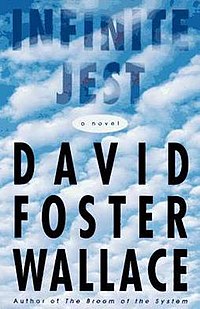
Infinite Jest, the novel that propelled David Foster Wallace to literary superstardom, is a sprawling tragicomic tale about addiction, consumerism, alienation, philosophy, tennis, and Quebec separatism, among other things.
Describing the plot of the novel can be a bit tricky. Set in the near future, much of the action is set at an academically rigorous tennis academy and the drug rehabilitation half way house across the way. Hal Incandenza, a mathematically gifted student at the school, run by his mother and uncle after his father’s untimely death, is extremely talented yet insecure, and has retreated to drug use as a means of easing his pain. Don Gately, a former thief and recovering Demerol addict is counselor in residence at the halfway house. As the plot progresses, both are drawn into the search for a film (“The Entertainment”) which is purportedly so compelling that it drives it’s viewers insane.
As I said, describing the plot can be tricky. At over 1000 pages (with 100 pages of footnotes), reading Infinite Jest is quite the daunting task, and given David Foster Wallace’s penchant for disjointed narrative structure and lack of exposition, making it through the early parts of the novel can be a struggle. I found, though, that somewhere between 150 and 200 pages in everything snapped into place, and the book became incredibly engrossing.
Wallace himself had a somewhat tragic life. A self-described “two time flunk out from Catholicism,” he battled major depression of and on for twenty years, before finally succumbing in September of 2008. The religious sense was often apparent in his work, though often at a submerged level (Good People, one of the late fiction pieces he published, is an exception in this regard). He will be missed.
















